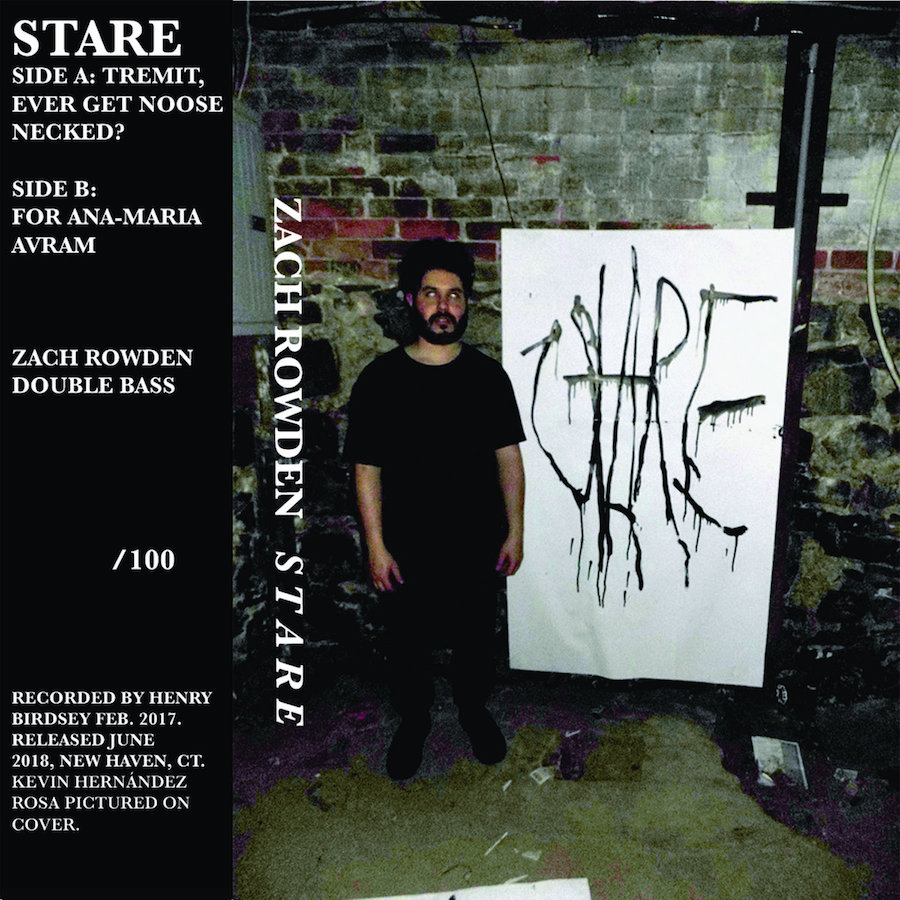
The cover of Stare . Courtesy Zach Rowden.
You hardly notice the third track to Stare, a new album out from experimental musician Zach Rowden, when it starts playing. His double bass is the pitter-patter of rain, the sound of small mice in old Connecticut houses. There’s something woody and hollow, interrupted by the contact of a finger, the persistent tapping of hands on the bass’ neck. If you are already halfway there, the music could lull you to sleep.
But something deep in the instrument asks you to stay with it. 54 seconds into the song, a string sounds, short and mournful as it whips back and forth. Then a set of sliding scales begin, and something comes over the song, slips into its every meditative corner.
That’s the trance-like allure of Stare, which dropped June 1 of this year after Rowden recorded, then held onto, it in February 2017. With three windy, experimental tracks that explode in harsh noise, it is new and old at once, opening a door to the recent past as he forges ahead with new musical work.
Stare starts in part with Rowden’s time as a graduate student at the Hartt School of Music, where he discovered the Romanian composer Iancu Dumitrescu and the work of his wife, Anna Maria Avram several years ago. What began as a passion for Avram’s work bloomed into a collaboration with her and Dumitrescu’s ensemble, ultimately taking Rowden to Romania with them.
At the same time, he was gaining an interest in trance states and experimental music, something he’d seen his colleagues achieve as they played classical pieces. That wasn’t his ministry, he realized—but experimental music was. It allowed him, he recalled, to get lost for minutes at a time. So he wrote tracks, including one dedicated to Avram. He recorded the album in February 2017 with his roommate Henry Birdsey. And then, for a while, he held onto it ambivalently.
“I was like, ‘I’ve gotta put it out, I’ve gotta put it out, I’ve gotta put it out,’” he recalled in a recent interview at Koffee? on Audubon. “I release a lot of music because I don’t like sitting on things—everything gets backed up when you don’t release stuff.”
But for a while, something held him back. As the months passed, he said he could feel himself turn against it, traveling through the “five stages of grief” as he listened, then listened again, then waited on releasing it. He went on tours and played for packed houses, composing new work as he traveled.
Then last August, Avram passed away at 56 in the couple’s home, located in a small Romanian town. And some of the pieces, already historical documents, took on a whole other layer of meaning.
Stare is, as its name suggests, above all meditative. From the first track (“Tremit”), listeners have an acute sense of Rowden’s interest in religion, Butoh dancing, and snake-handling without him ever having to add lyrics. The double bass is the sound of a radio tuning, meditative as it evens out, then becomes shaky again. It blooms and transforms: an electric saw, an angry, low feedback loop, the slow open of a haunted house door. It does not keep you on your toes so much as in one unmoving spot, fixed as sound washes over your whole body. It is an all-encompassing thing, meant t be listened to again and again.
So too its second track “Ever Get Noose Necked?,” where the double bass transforms into a record scratching something until it makes a quick, certain cry. Rowden is careful in his playing: the bass may be minimal, but can mimic brass and didgeridoo, its mewling harsh and distinctly un-bass-like as it unfolds. Every silence—and there are just a few—is held breath, every quick build of noise a collision on some unknown road. It’s a hypnotic piece that asks nothing of you, except a second listen.
“The idea in the record is actually listening and being aware of it,” he said. “You know? Staring at something, you’re not really thinking that much. So when things happen, you zoom in.”
But the album, which was written before Avram’s death and includes a dedication to her, also feels like a requiem. The album’s B side, aptly titled “For Anna Maria Avram,” creeps in quietly, the track humble and whispering in its first minute. It walks a careful line until it doesn’t, crashing down just before the five minute mark, and then dipping into the most delicious, practiced silence. It is discordant and choppy because it’s supposed to be, with no apologies and as much heart as there is skill. Indeed, note by plucky note, It asks you to stare out into something unknown, and slide into its nuance on multiple listens.
And for Rowden, it’s a document like no other he has yet created, or will create. In the track is his love for Avram and Dumitrescu, but also the sense of a specific place in time, as he stares out into the wide world, and sees if anyone or anything is looking back.
“It’s a complete view of that period of my life,” Rowden said. “You leave a trail of breadcrumbs around the world, and people listen to it at some point.”
Stare is available on Bandcamp or in real life. Rowden performs this Saturday night with Gus Caldwell and Kodak Fire; click here for more details.